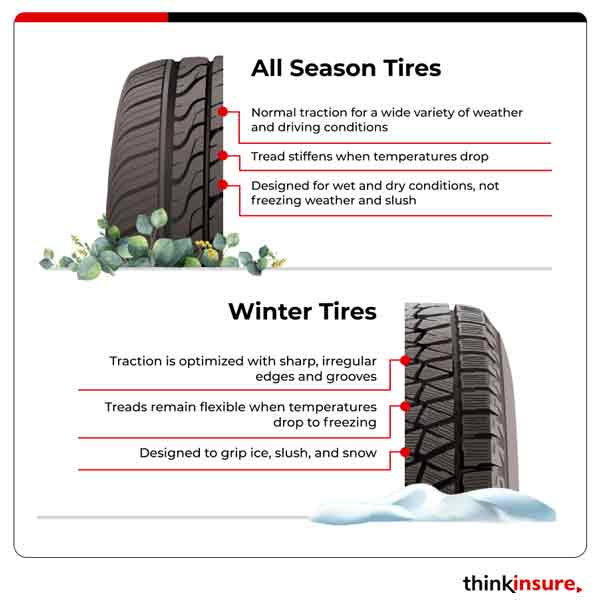
Written by Kayla Jane Barrie Updated on Feb 25, 2025 4 mins read

Investing in winter tires can provide your vehicle with many benefits for driving in the winter. But not in the summer.
Using winter tires in summer can reduce their lifespan by 60% instead of if only used in winter. You will need to replace them a lot sooner when you use them 12 months in a row. Plus, there are risks involved with using them. They can cause many issues with your wheels and tire tread pattern, and they lack the necessary qualities to have a safer drive.
You can, but it's highly recommended you do not use winter tires in summer.
The rubber is designed to work best in the cold - they are made with is less effective at dispersing heat, which increases the risk of over-inflating and blowouts.
The rubber compound in winter is softer; the tread changes shape more and will create more rolling resistance, and it uses more gas if used in summer. The rubber is more flexible, affecting how your vehicle will handle the road; sharp, sudden turns often result in losing control.
They are created to stay soft and grip at temperatures below 7°C. All-season and summer tires have a harder rubber and grip best at temperatures above 7°C.

The main differences between winter and summer tires are the thread and the type of rubber. Snow tires have a deeper tread pattern with thin cuts than summer tires with larger treads.
Summer, or all-season, tires are designed to be used above 7°C. Summer tires are made from a softer rubber and fitted with large tread blocks to give maximum contact with the road. Summer tires have more grip in warm weather and handle turning and braking better in wet and dry conditions. Summer tires do not grip well in cold weather, snow or ice. The regular tread is made for dry and wet conditions.
Once temperatures drop, the soft rubber begins to harden, and traction suffers. Colder temperatures can cause the tread block edge chipping, or the tread rubber can crack. Tire companies generally treat these issues due to improper use and will rarely be covered under warranty.
Winter tires are designed to handle cold weather and harsh elements. The treads have very thin cuts (sipes) across them. The tread helps to flush out excess slush buildup, and the sipes help pack snow. The tread blocks allow for traction with ice and snow. The rubber is specially designed to grip cold, dry pavement.
Once the daily temperature is consistently above 7°C, it’s time to put on your summer tires. This will ensure your tires are working to their optimal traction.
There is no law for having winter tires in Ontario, but it's worth considering to have a safer drive and save on auto insurance in Ontario. Quebec and British Columbia are the only provinces in Ontario where it is mandatory to have winter tires.
If you use winters in the summer, the soft rubber tread will change shape, creating more resistance. Higher temperatures and summer roads will compromise acceleration, cornering and braking.
Here are three reasons why you should not use winter tires in summer:
The rubber on winter tires will wear down quickly on warm and hot road surfaces. The tread will wear down faster and unevenly due to the heat.
Winter tires will lack traction and handling in the summer. They perform better with ice and snow.
You will use more gas to compensate for the lack of acceleration and traction. Summer tires have a harder compound that allows them to roll better.
Using winter tires in summer can cause the rubber and tread to wear down quickly. The heat can increase the risk of a blowout. The risk of hydroplaning also increases because winter tires don’t grip as effectively compared to summer or all-season tires in warm, wet weather.
The increased grip and traction from winter tires will increase fuel consumption because they provide greater resistance. This will cost you more money in fuel.
You will significantly reduce the lifespan of your winter tires if you use them in warm conditions. How long they will last will depend on how often you drive, their age and their condition.
Depending on the type of tires, winters will generally be narrower than all seasons. Tires are measured by their width in millimetres - that's why buying the right type for your vehicle is important.
It may seem like a good idea to keep your winter tires on during the summer to save time and money, but it could end up costing you more in the long run, especially if you do a lot of driving. It's important to avoid premature wear and tear on your winter tires by only using them during the winter months when they are designed to be used.
| Categories | Auto |
|---|---|
| Tags | Repairs and MaintenanceDriving TipsAuto Coverage |
Read our insurance blog to get helpful tips, information and news.
Big changes are coming to Ontario car insurance. Starting July 1, 2026, many accident benefits will become optional. Learn how these "à la carte" reforms impact your coverage and why opting out could be a major financial risk.
Learn about Canada's new Electric Vehicle Affordability Program (EVAP). Discover how the $50,000 transaction rule works, which cars qualify, and how to claim your rebate.
Fatal collisions in Canada rose 9.14% from 2019 to 2023. Discover the latest road safety statistics, provincial rankings, and how these trends affect your auto insurance rates.
Find out if a seatbelt ticket will raise your car insurance rates and how insurers view seatbelt violations.